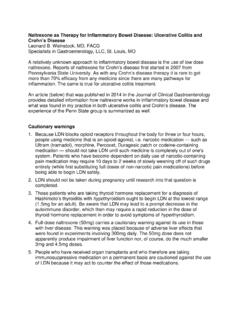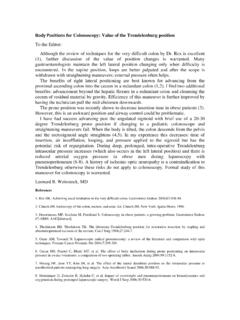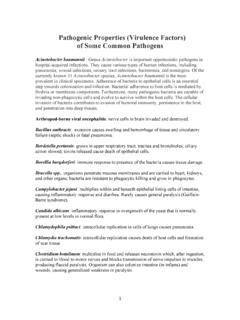Transcription of Chronic prostatitis and small intestinal bacterial ...
1 The Canadian Journal of Urology ; 18(4); August 2011 Accepted for publication March 2011 AcknowledgmentsThis investigator-initiated study was funded by Salix Pharmaceuticals, Inc. Editorial assistance was provided under the direction of Dr. Weinstock by MedThink Communications with support from Salix Pharmaceuticals, correspondence to Dr. Leonard B. Weinstock, 11525 Olde Cabin Road, St. Louis, MO 63141 USAC hronic prostatitis and small intestinal bacterial overgrowth : effect of rifaximin Leonard B. Weinstock, MD,1,2 Bob Geng, MD,3 Steven B. Brandes, MD41 Internal Medicine, Washington University School of Medicine, St. Louis, Missouri, USA 2 Specialists in Gastroenterology, LLC, St. Louis, Missouri, USA3 Department of Internal Medicine, Washington University School of Medicine, St. Louis, Missouri, USA4 Department of Surgery, Washington University School of Medicine, St.
2 Louis, Missouri, USAWEINSTOCK LB, GENG B, BRANDES SB. Chronic prostatitis and small intestinal bacterial overgrowth : effect of rifaximin. The Canadian Journal of Urology. 2011;18(4) : This pilot study determined the effi cacy of rifaximin, a gut-directed antibiotic, in reducing Chronic prostatitis (CP) and gastrointestinal (GI) symptoms in patients with CP type III. The prevalence of small intestinal bacterial overgrowth (SIBO) and irritable bowel syndrome (IBS) in patients with CP was also evaluated. Materials and methods: Chronic prostatitis patients were recruited and screened for SIBO and IBS using the lactulose breath test (LBT) and Rome II criteria, respectively. Patients with a positive LBT result and Chronic prostatitis Symptom Index (CPSI) score 15 received rifaximin 550 mg three times daily for 10 days.
3 The CPSI score and global improvement of CP and GI symptoms were ascertained at screening (ie, 7 days before therapy), at baseline immediately before therapy (ie, day 0), and on days 14 and 28. Results: Fourteen of 16 CP patients (88%) had a positive LBT result and were included in this therapeutic study (mean age, 41 years). Mean CPSI score signifi cantly decreased from screening to day 28 (ie, 18 days after rifaximin treatment; p = ). Mean abdominal pain and bloating scores were also signifi cantly reduced on day 28 versus baseline (p = and p = , respectively). Chronic prostatitis patients with IBS and SIBO had a statistically signifi cant response as well. Conclusions: Data from this pilot study suggest that SIBO and IBS are common in CP and that patients with CP and SIBO may benefi t from rifaximin therapy.
4 Further studies are warranted. Key Words: Chronic prostatitis , small intestinal bacterial overgrowth , antibiotic, rifaximin, lactulose breath test, CPSI scorehave been shown to correlate with CP The presence of these infl ammatory cytokines may result in the recruitment of leukocytes and the sensitization of local neurologic pain mechanisms;6 however, participating factors underlying augmentation of cytokine levels remains unknown. Because of the lack of known pathophysiology for CP, effective treatments for CP are Therapies such as -blockers,7 fi nasteride,8 corticosteroids,9 and quinolone antibiotics7 are often used for CP but are generally unsatisfactory because of the lack of effi cacy or elicitation of adverse events. Identifi cation of a novel pathophysiologic mechanism would broaden the therapeutic options for CP and enhance treatment development.
5 The use of rifaximin as a therapy for CP was contrived because of the success of rifaximin therapy in interstitial cystitis, another Chronic pelvic pain syndrome,10 and the efficacy of rifaximin in eradicating small intestinal bacterial overgrowth (SIBO).11,12 IntroductionChronic prostatitis (CP) is an idiopathic syndrome characterized by pelvic pain, increased urinary frequency and urgency, and sexual Patients with CP type III do not exhibit signs of bacterial infection,2 although levels of infl ammatory cytokines (ie, interleukin 6, interleukin 1 , tumor necrosis factor )3,4 are signifi cantly increased in the seminal plasma of patients with CP type III versus healthy controls and 5826 The Canadian Journal of Urology ; 18(4); August 2011 small intestinal bacterial overgrowth is an increase in bacterial concentration in the small intestines that leads to systemic infl ammation and abdominal This disorder is common in patients with abdominal pain disorders such as irritable bowel syndrome (IBS),14,15 and its eradication by gastrointestinal (GI)-targeted antibiotics such as rifaximin has shown success in treating GI ,12,16 The present pilot study evaluated the effi cacy of rifaximin for the reduction of CP and GI symptoms in patients with CP type III and examined the association among CP type III, SIBO, and and methodsPatient populationPatients with CP type III (including types lllA and lllB) were recruited from April 2007 to June 2009 via referrals from urologists in St.
6 Louis, MO, who were informed about the study through the mail. Patients were screened by a nurse coordinator using the diagnostic criteria for CP and the National Institutes of Health Chronic prostatitis Symptom Index (CPSI) Further, all patients had negative cultures of expressed prostatic secretions and had prostatitis symptoms lasting 3 months. In addition, patient records were reviewed to confi rm the diagnosis of CP type III. Patients were excluded if they were dependent on narcotics, had used antibiotics or probiotics within 6 weeks of the study, or had undergone intestinal surgery with the exception of appendectomy or cholecystectomy. Patients were also excluded if they had known systemic causes of SIBO other than IBS (ie, rheumatoid arthritis, scleroderma, end-stage renal disease, diabetes, hyperparathyroidism, gastric surgery, Chronic liver disease, celiac disease, and Crohn s disease) or if they had an alternative urological condition diagnosed by a urologist.
7 The investigation was approved by a human studies committee (Sterling IRB, Atlanta, GA), and informed consent was provided by all designPatients underwent a screening visit 7 days before initiation of rifaximin therapy. At this visit, patients were assessed for IBS, positive lactulose breath test (LBT) result, and severity of CP and GI symptoms. Patients also underwent similar baseline assessments immediately before the beginning of antibiotic therapy (ie, day 0). Patients with CP who had a positive LBT result 180 minutes after lactulose ingestion and a CPSI score 15 were administered rifaximin (Xifaxan; Salix Pharmaceuticals, Inc, Morrisville, NC, USA) 550 mg three times daily ( ) for 10 days. Patients were then followed for 18 days (ie, total study duration of 28 days). Study assessments Lactulose breath test: Patients with CP had an LBT at screening and on study day 14.
8 Breath samples were collected before and every 20 minutes for 180 minutes after the patient ingested 10 g of lactulose mixed in 250 mL of water. Hydrogen and methane content of the samples was analyzed by gas chromatography (QuinTron DP Plus MicroLyzer; QuinTron Instrument Company, Milwaukee, WI, USA). A positive result was defi ned as an increase of 20 ppm from baseline in hydrogen, methane, or both gases within 180 minutes after lactulose ingestion. Results of LBT tests were also examined in a post hoc analysis using an increase of 20 ppm from baseline in hydrogen, methane, or both gases within 100 minutes as the criterion for a positive LBT result. Additionally, patients with fl atline LBT results (ie, an increase of no more than 5 ppm of hydrogen above a baseline less than 3 ppm of hydrogen and the absence of methane production for 180 minutes) were considered to have a positive result.
9 Flatline results were considered positive because this response may be attributed to the production of hydrogen sulfi Lactulose breath test results were compared with previously published data in healthy controls (ie, individuals who did not have GI symptoms, CP, or other diseases or disorders) that used criteria for LBT abnormality identical to those used in the present Irritable bowel syndrome: Patients were diagnosed with IBS at screening using Rome II criteria (ie, abdominal discomfort for 3 months/year with altered bowel habits and form and with some relief of discomfort with the passage of bowel movements).20 Patients with IBS were asked to complete the IBS-Quality of Life (IBS-QoL) questionnaire at screening and on day 14. Chronic prostatitis symptom severity: Symptoms of CP were assessed at screening, at baseline, and on days 14 and 28 using the CPSI Additionally, prostatitis global response (PGR) was ascertained using a Likert scale in which patients rated improvement in CP symptoms as follows: 0, none; 1, mild; 2, moderate; or 3, marked.
10 Patients with mild, moderate, or marked improvement were considered to be clinical responders. Gastrointestinal symptom severity: Severity of abdominal pain and bloating was assessed at screening, at baseline, and on days 14 and 28 using a Likert scale in which responses to each question were as follows: never WEINSTOCK ET The Canadian Journal of Urology ; 18(4); August 20115828 Chronic prostatitis and small intestinal bacterial overgrowth : effect of rifaximin affected; 0, not at all bothered; 1, hardly bothered; 2, somewhat bothered; 3, moderately bothered; 4, a good deal bothered; 5, a great deal bothered; or 6, a very great deal bothered. Adverse events: Adverse events were reported on days 14 and 28 in response to the question, Have you experienced any side effects? Statistical analysisDescriptive statistics, including standard deviations, were used to summarize results at screening, at baseline (ie, day 0), and on days 14 and 28.











